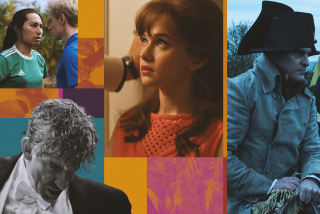Restoration Is Simply ‘Grand’
- Share via
Jean Renoir’s 1937 antiwar masterpiece, “Grand Illusion,” is one of the greatest films ever made. Winner of the New York Film Critics Circle award for best foreign film, the World War I drama also was the first foreign film ever to be nominated for a best picture Oscar.
For nearly 50 years, the original camera negative was thought to have been destroyed in an air raid in Paris in 1942. The Nazis had tried to obliterate the film, describing it as “cinematographic enemy No. 1.” But the negative recently was found unlabeled on a shelf at the Cinematheque in Toulouse, France.
The digitally restored “Grand Illusion” opened this summer in theaters to rave reviews, and now Criterion has released it in a magnificent DVD version ($40). The print is astonishingly beautiful. Compared to fuzzy copies of the film, this “Grand Illusion” is a revelation. One can almost see every one of star Jean Gabin’s long eyelashes.
The performances--from Gabin, Pierre Fresnay, Erich von Stroheim (billed as Eric von Stroheim) and Marcel Dalio--are as fresh as they were in 1937.
The disc includes a new and improved English subtitle translation, plus a wonderful radio presentation of Renoir and Von Stroheim accepting the New York Film Critics Circle awards. Excerpts from the recent press book feature an essay on Renoir by Von Stroheim, essays on the film title and the recent discovery of the camera negative as well as cast bios. In a rare snafu, however, the photo that runs with the biography of Dalio is not of the actor.
Another juicy offering is Renoir’s intro to the 1958 re-release of “Grand Illusion.” He talks about the history of the film and even points out that the flight suit Gabin wears was actually the director’s own uniform from World War I.
The audio commentary by film historian Peter Cowie--which originally appeared on the laser disc version--is a bit too esoteric, but it offers insight into Renoir’s inception of the film as well as discussions on the acting styles of Gabin, Fresnay and Von Stroheim.
*
Critieron also has released the recently restored British version of Sir Carol Reed’s delicious 1949 thriller, “The Third Man” ($40), which was penned by Graham Greene and stars Joseph Cotton, Orson Welles, Valli and Trevor Howard. Set in postwar Vienna, the thriller finds Welles as Harry Lime, a murderous black marketeer, and Cotten as his childhood friend, dime novelist Holly Martins. “Third Man” is noted for its terrific black-and-white cinematography, nifty performances, clever plot twists, a memorable chase sequence in the Vienna sewers and Anton Karas’ zippy zither score.
The disc features a fun video intro by Peter Bogdanovich, an abridged recording of Greene’s treatment of “Third Man,” which can be played as a separate track over the film, and the opening of the American version, which features a voice-over by Cotten. The British version features a voice that is supposed to belong to an unknown cynical racketeer. (Reed himself supplied that voice.)
There’s also archival footage of Karas playing the zither in a restaurant and a newsreel following the police patrolling the Vienna sewers.
Also included are two radio shows: Welles stars in an episode of the radio series “The Many Lives of Harry Lime” from 1951, and Cotten repeats his role of Martins for the “Lux Radio Theatre” version.
Production stills and cinema lore offer such tidbits as the fact that co-producer David O. Selznick originally wanted Jimmy Stewart to play Martins and believed Welles was box-office poison. There is also a restoration demonstration that shows some of the 22,000 fixes that were digitally made. Also included are the original and re-release theatrical trailers. The original one is a real hoot, proclaiming that Karas’ zither music will send audiences into a “dither.”
*
For those who were born to be wild, there’s the far-out and groovy 30th anniversary edition of the seminal biker flick “Easy Rider” (Columbia TriStar, $25). The low-budget film, which stars Peter Fonda and Dennis Hopper, captured the unrest of the decade, altered the way Hollywood approached filmmaking and made a star out of Jack Nicholson, who plays a drunken ACLU lawyer.
Besides the wide-screen digitally remastered print, the disc includes a terrific documentary, “Easy Rider: Shaking the Cage,” which features interviews with actors Hopper, Fonda, Karen Black and Luke Askew and with cinematographer Laslo Kovacs, associate producer William Hayward and production manager Paul Lewis. The documentary chronicles the film’s troubled but colorful history.
Hopper, who also co-wrote and directed this classic, supplies low-key but interesting commentary.
More to Read
Only good movies
Get the Indie Focus newsletter, Mark Olsen's weekly guide to the world of cinema.
You may occasionally receive promotional content from the Los Angeles Times.











